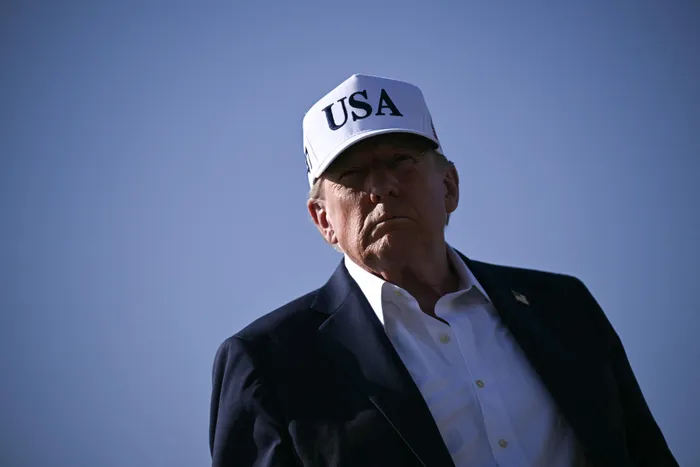US tariffs threaten South African jobs, warns Cosatu

Cosatu Parliamentary Coordinator, Matthew Parks, on Tuesday said Cosatu is deeply concerned about the 30% tariff announced by US President Donald Trump, because it will have a devastating impact on the economy that has been languishing at 1% growth rate and a shockingly high unemployment rate of 43.1%
Image: AFP
South Africa is facing a looming economic crisis following the United States' announcement of a sweeping 30% tariff on its exports - a move that has sparked widespread concern among trade unions, political leaders, and business analysts.
Cosatu Parliamentary Coordinator, Matthew Parks, on Tuesday said Cosatu is deeply concerned about the 30% tariff announced by US President Donald Trump, because it will have a devastating impact on the economy that has been languishing at 1% growth rate and a shockingly high unemployment rate of 43.1%,.
Sectors that will be hard hit include the automotive, agriculture, clothing, chemical and jewelery.
"Worryingly, the impact of the impending tariff is already being felt in the Eastern Cape with 900 jobs on the line at Good Year SA and Mercedes Benz "temporarily" shutting down its vehicle production," it said.
Cosatu said it is clear more engagement with the US government is required is find alternatives that will be beneficial for jobs and businesses in both countries.
"It is also critical that South Africa works to expand relations with other trading partners to mitigate reliance on the US," it said.
Cosatu said it supports Department of Trade, Industry and Competition engagements with the US government to put in place a new trade agreement that is favourable to both nations and in particular workers.
"We hope the US Congress will renew Agoa (African Growth and Opportunity Act) as this would help ensure continued favourable access to South African and African exports to the US markets," it said.
It further said that it was key that the UIF’s TERS administrative challenges be urgently addressed to offer affected companies support while they put in place plans to manage this potential calamity.
John Steenhuisen, leader of the Democratic Alliance, said while not explicit, the announcement would signal the end of the Agoa which gives South Africa duty-free access to the US for more than 6 000 products, including goods in the automobiles, agriculture and textile industries.
He said thousands of farmers, manufacturers and workers jobs are now at risk. Billions of rands will be lost in export revenue, making this a crippling blow to the economy.
Meanwhile, Andrew Bahlmann, the CEO of Corporate & Advisory, Deal Leaders International, warned the imposition of a sweeping 30% tariff by the United States on "any and all South African products," effective August 1, represents a seismic shift with profound implications for Mergers and Acquisitions (M&A) and Foreign Direct Investment (FDI) into South Africa.
Bahlmann said, "This unilateral move, ostensibly aimed at correcting a perceived trade imbalance, fundamentally alters the economic calculus for both existing and prospective investors."
Firstly, Bahlmann said, the tariffs act as a significant disincentive for FDI into South Africa.
"Why would a foreign entity establish or expand manufacturing operations in South Africa if a crucial export market like the US is subject to a prohibitive 30% penalty?," he said, adding that this directly undermines South Africa's attractiveness as a production hub for goods destined for the American consumer.
He said President Donald Trump's explicit offer of "There will be no tariff if South Africa, or companies within your country, decide to build or manufacture product[s] within the United States" was a clear directive to redirect FDI away from South Africa and other countries into the US, potentially leading to capital flight or a re-evaluation of global supply chains.
Secondly, Bahlmann said the tariffs will undoubtedly chill M&A activity within South Africa. Companies heavily reliant on US exports, particularly in sectors like automotive and agriculture (already flagged for devastating job losses), become less appealing acquisition targets. Their revenue streams are now threatened, and their valuations will likely decrease, making them less attractive for foreign buyers seeking growth or market access. This increased uncertainty and reduced profitability will likely lead to a slowdown in deal-making as investors adopt a wait-and-see approach or seek opportunities in less volatile markets.
"This environment of heightened trade friction and perceived governmental unpreparedness creates an unfavourable climate for long-term capital commitments, impacting both greenfield FDI and strategic M&A. While calls for diversification are valid, building new trade relationships and industrial resilience is a long-term endeavour that cannot immediately offset the impact on established export channels," he said.
Despite these significant headwinds, Bahlmann said the South African market, with its inherent value, diverse sectors and resilient businesses, continues to present compelling M&A opportunities for discerning foreign investors.
"While the landscape is undoubtedly more complex, it is precisely in such times of disruption that strategic advantages can be forged," he said.
BUSINESS REPORT